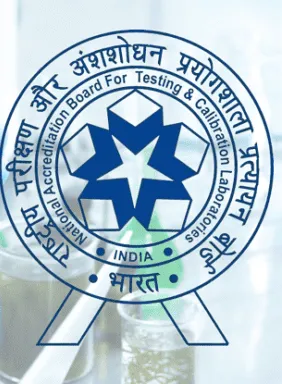

National Accreditation Board for Testing and Calibration Laboratories (NABL)
NABL(National Accreditation Board
for Testing and Calibration Laboratories) : It is an autonomous body under the aegis of the
Department of
Science and Technology, Government of India, and is responsible for the accreditation of testing and
calibration laboratories in India.
The primary objective of NABL is to provide a reliable and internationally recognized system for the
assessment and accreditation of testing and calibration laboratories. This accreditation is based on
internationally accepted standards, and it ensures that the laboratories operate to the highest levels of
quality, competence, and impartiality.
NABL accreditation is essential for laboratories that provide testing, calibration, and measurement services.
It provides an independent third-party assurance of the quality and technical competence of the laboratory's
operations. NABL accreditation also enhances the credibility and acceptance of the laboratory's test reports
and calibration certificates in national and international markets.
Overall, NABL accreditation is a significant step towards ensuring that testing and calibration laboratories in India meet internationally accepted standards and can provide reliable and accurate results.
Reference Material Laboratories
Laboratories that analyse different materials' reactions would also require approval from the NABL. The following reference material laboratories require this approval:
- Biological processes
- Engineering Processes
- Genetics Industry
- Pharmaceutical Industries
Scope of NABL Accreditation
NABL Accreditation is currently being given in the following fields and disciplines. Depending upon the scope discipline belongs to the multi-disciplinary. CABs shall have to apply in relevant discipline separately. On the scope of accreditation, refer to the relevant specific criteria:
- Testing
- Calibration
- Medical
- Biological
- Photometry
- Chemical
- Radiological
- Electronics
- Fluid-Flow
- Mechanical
- Forensic
- Electro-Technical
- Medical Devices
- Therma
- Optical
- Clinical Pathology
- Haematology
- Immunohematology
- Microbiology, Serology
- Histopathology
- Cytopathology
- Genetics
- Nuclear Medicine (in-vitro tests only)
- Proficiency Testing Providers
- Reference Material Producers
Eligibility Criteria for NABL Approval
First and foremost, the institution must be a CAB engaged in relevant activities such as:
- Laboratory testing
- Calibration
- Food processing
The institution must also have a developed quality manual that aligns with recognized standards such as:
- ISO/IEC 17025:2005
- ISO 15189:2012
- ISO/IEC 17043:2010
Additionally, the CAB must appoint a manager who has received relevant training of at least four days on internal audit and management policies. The prepared quality document should be implemented immediately, and the CAB must also fulfill the criteria outlined in NABL 130, which specifies the requirements for site testing and site calibration laboratories.
Furthermore, any applicant must participate in the Proficiency Training Program conducted by NABL or an international institution. In cases where such training is unavailable, the institution may conduct an inter-lab comparison for quality assessment. For participation, the minimum standard must include one parameter or one test.
Lastly, the CAB must complete at least one internal audit and management review before applying for NABL approval.
Procedure for NABL Approval
- Step 1- Make an Application
- Step 2- Payment of Fees
- Step 3- Receipt of Application
- Step 4- Pre-Assessment Visit
- Step 5- Submission of Report
- Step 6- Assessment Team
- Step 7- Follow-up Action
- Step 8- Recommendations
- Step 9- Grant of Certificate
- Step 10- Outstanding Amount
- Step 11- Compliance
For NABL Approval / Renewal, please contact us: Ornate, Mobile:+91-926-633-3338, Email: Chetan@ornatequality.com -> Contact us
FREQUENTLY ASKED QUESTIONS (FAQ)
1. Why do laboratories need NABL accreditation in India?
Laboratories need NABL accreditation to prove their testing or calibration results are accurate and reliable. It builds trust with customers, regulators, and international clients by meeting global quality standards.
2. What’s the main difference between NABL testing and calibration labs?
Testing labs check product or material quality, while calibration labs make sure measuring instruments give correct readings. Both types of labs need NABL approval for their results to be officially recognized.
3. Can research or pharma labs also get NABL accreditation?
Yes, research and pharmaceutical labs can apply for NABL accreditation if they follow ISO/IEC standards and maintain proper quality systems. It helps them improve reliability and get recognized results.
4. What problems do labs usually face during the NABL approval process?
Most labs face issues like missing documents, untrained staff, or incomplete internal audits. Getting expert help from Ornate Certification can make the NABL process faster and stress-free.
5. How can Ornate Certification help my lab get NABL accredited?
Ornate Certification guides you through every step — from preparing documents to internal audits, mock assessments, and coordination with NABL officials — ensuring your lab gets accredited smoothly.







